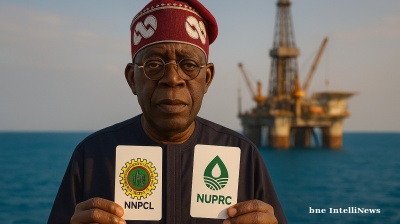“The Turkey-Germany crisis is temporary. One must refrain from words that would cause lasting harm to the economies,” Turkish Economy Minister Nihat Zeybekci told Reuters on July 21.
"All German investments in Turkey are 100 percent under the guarantee of the Turkish government, the state and law," Zeybekci added in an Ankara interview with the news service as analysts started to wonder whether what seems to be a new all-time low in modern-day relations between Berlin and Ankara might result in some serious economic damage.
Reacting to some latest unsettling events in Turkey – subject to presidential rule by decree under a state of emergency that has now been in place for more than a year – Berlin on July 20 turned up the heat on the Turkish government. German Foreign Minister Sigmar Gabriel took the lead, warning German tourists and other German nationals to exercise more caution in traveling to Turkey and declaring: “We need our policies towards Turkey to go in a new direction. We can't continue as we have done until now.”
Germany's DIHK chambers of commerce then also cranked up the pressure on the Turkish government, with the DIHK foreign trade chief Volker Treier saying it is hard to imagine German enterprises investing in Turkey given the fraught bilateral relations, and stating: "Uncertainty among German companies has been felt significantly since the failed putsch."
Ankara cannot afford to take relations with Berlin lightly: in 2015, 15.4% of foreign arrivals in Turkey were Germans, Germany is the biggest buyer of Turkish exports, more than 6,000 German companies operate in Turkey and German investments in Turkey during 2002-2015 amounted to nearly $8.5bn.
Berlin was ostensibly prompted to reorientate its stance towards Turkey following the arrest of six human rights activists in Istanbul, including a German citizen, but it has lately also been disturbed by unprecedented incidents such as the July 5 detention of Amnesty International Turkey chair Taner Kilic which the human rights organisation described as “a politically motivated persecution that charts a frightening future for rights in Turkey.”
Schaeuble: Just like the old GDR
German Finance Minister Wolfgang Schaeuble stepped into the row on July 21 comparing Turkey to former communist East Germany. He told Bild newspaper that Turkey was showing an unwillingness to meet basic consular standards, which he said reminded him “of how it used to be in the GDR [the German Democratic Republic, as East Germany was known]”.
Schaeuble reportedly added: “It was clear to whoever traveled there: If something happens to you, no one can help you... If Turkey doesn’t stop this game, we’ll need to tell people that you travel there at your own risk, we can no longer offer you guarantees.”
Turkish President Recep Tayyip Erdogan responded to the comments from German ministers by, according to Bloomberg, telling an event in Istanbul on Friday: “I’d like to remind my German friends and the whole world: You aren’t strong enough to slander Turkey... You aren’t strong enough to scare us with these kinds of things. We will continue to have German companies operating in Turkey under assurance as we have until today.”
The Ankara government has also responded to Berlin by saying that it will not bow to “German’s threats and blackmail”.
Turkey’s foreign ministry described the ongoing row as “a serious confidence crisis between Berlin and Ankara”.
“Remarks by German Foreign Minister Sigmar Gabriel were the latest and an unacceptable example of this one-sided distorted approach,” the ministry said in a statement on July 20.
In his interview with Reuters, economy minister Zeybekci also dismissed allegations that Ankara gave Berlin a list of companies it was targeting for suspected links to last year's foiled coup attempt.
The alleged list of 68 companies and individuals names the car maker Daimler and giant chemical company BASF as backers of terrorism, German weekly Die Zeit reported this week.
German news broadcaster n-tv, meanwhile, said on July 21 that it would no longer run adverts that aimed to attract investment to Turkey, according to Reuters.
“The political backdrop has completely changed and our sales team has decided that showing the campaign no longer makes sense," the broadcaster said in a statement on its website.
Germany is also reviewing arms projects involving Turkey. Bild has reported that Berlin is putting arms projects with Turkey on hold.
Despite the political tensions, German consumer electronics retailer Ceconomy and food wholesale company Metro said on July 21 that they still see opportunities on the Turkish market.
“Our market share is growing. We are investing in our presence there," a spokeswoman for Ceconomy told Reuters on July 20. Cecenomy has 45 Media Markt and Saturn stores in Turkey.
A spokesman for Metro told Reuters that “it was monitoring the situation but also saw opportunities to develop.”
News

Fuel prices in Kyrgyzstan rocket as Ukraine steps up drone strikes on Russian refineries
Central Asian country relies on Russia for nine-tenths of its fuel.

El Salvador leads Latin America's democratic decline, global watchdog warns
The latest IDEA report warns El Salvador faces the fastest democratic erosion in Latin America, with security policies under Bukele raising concerns over freedoms, judicial independence, and long-term institutional damage.

Nigerian president advances oil bill placing NNPCL under control of Finance Ministry, upstream regulator
President Bola Tinubu has endorsed a bill that would undermine the "independence" of NNPCL, shifting ownership to the Finance Ministry and handing new powers to upstream regulator NUPRC.

‘Tinder Swindler’ Simon Leviev detained in Georgia on Interpol red notice
Shimon Yehuda Hayut gained worldwide notoriety thanks to the 2022 Netflix documentary 'The Tinder Swindler', which detailed how he allegedly posed as the son of billionaire diamond tycoon to scam women he met on Tinder.
_1758026150.jpg)
_2 Cropped.jpg)


